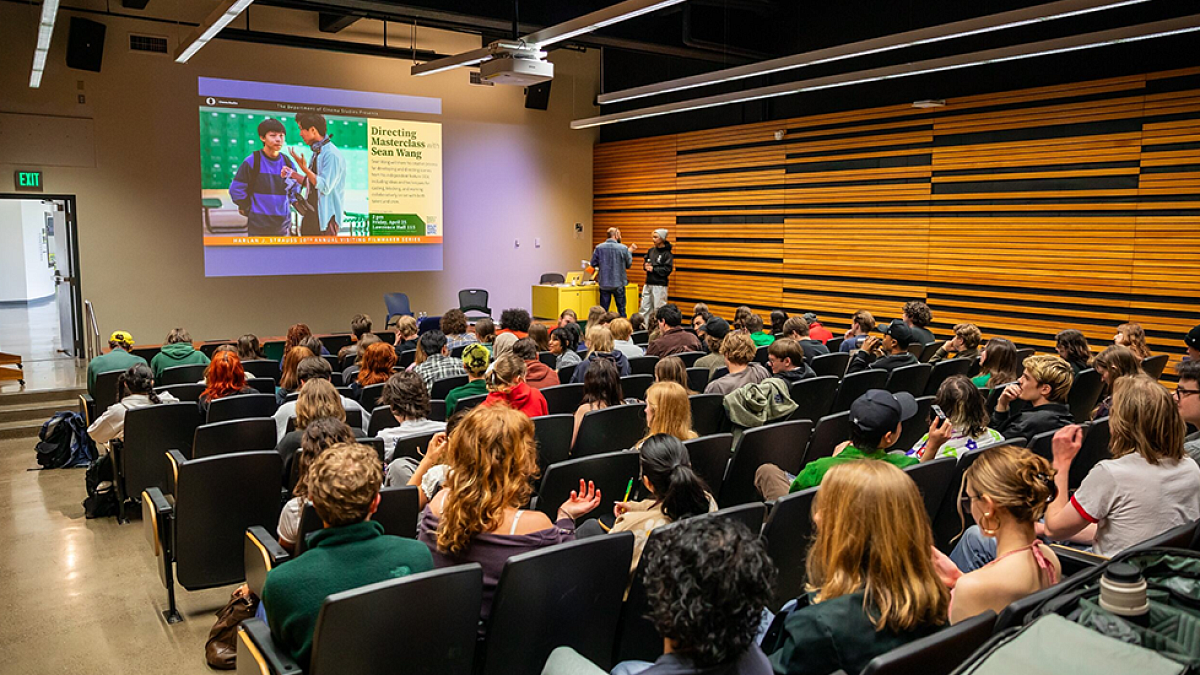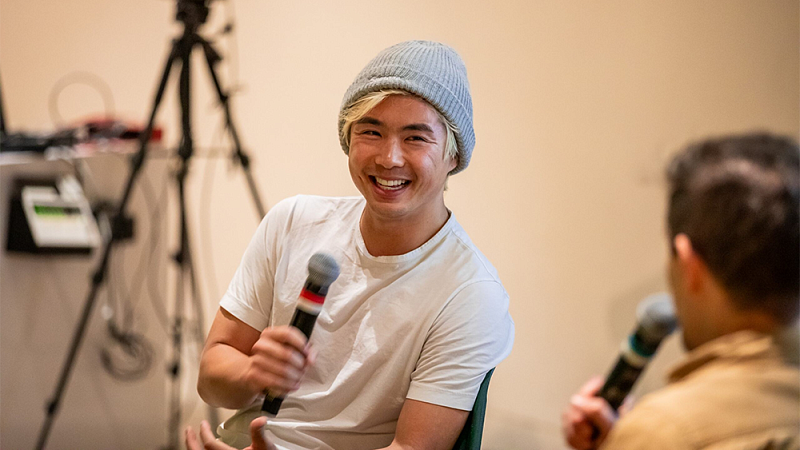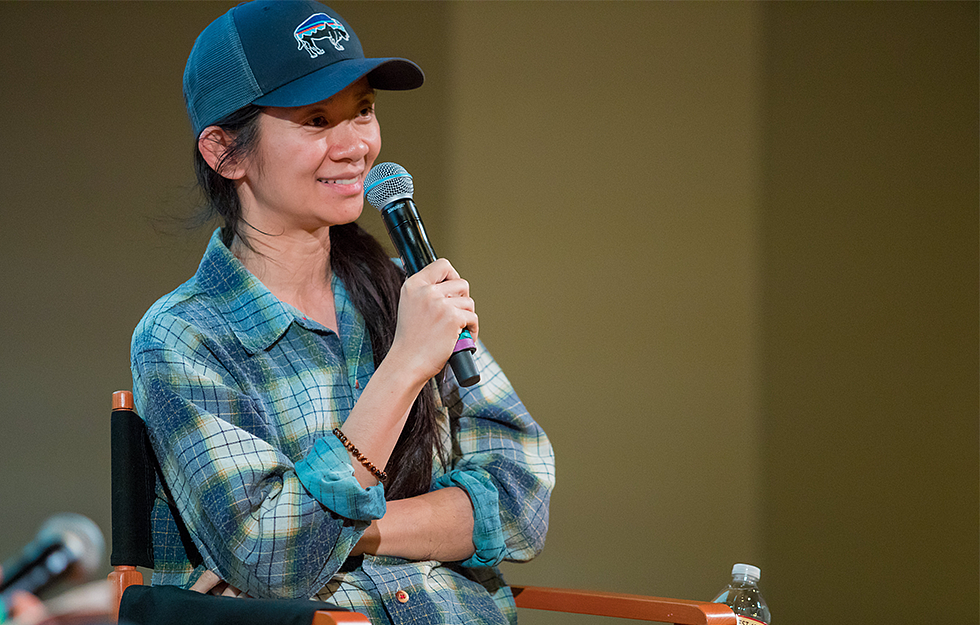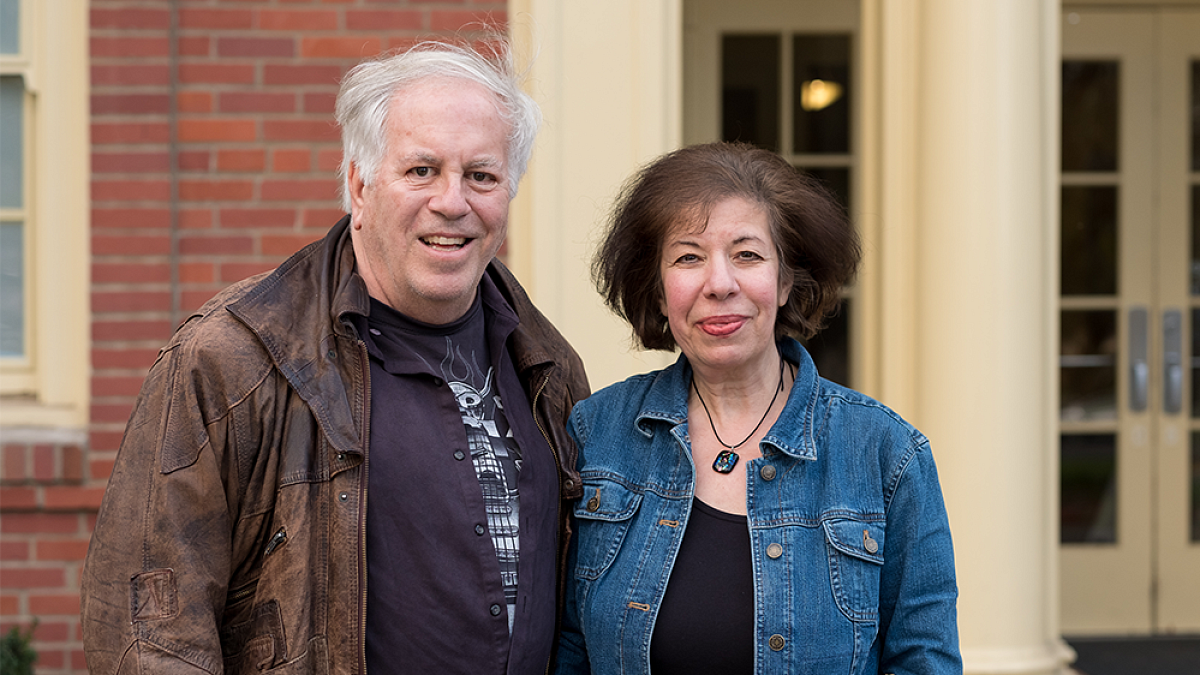
Experiential Learning | Research & Innovation | Community Impact | Career Preparation | Teaching Excellence | 21st Century Liberal Arts | Building Community | Good Vibes | CAS Spotlights | All Stories | Past Issues

Peeking Behind the Curtain
BY JENNY BROOKS
JUNE 9, 2025
It was standing room only in the lecture hall, where students and community members packed in for a free film screening.
But the real draw was the chance to learn from an expert. Academy Award-nominated director Sean Wang, whose film was about to be screened, was in the house to share his experience and advice with students in the Cinema Studies department.
Wang is an award-winning director who is still in the early stages of his career. His feature film, Dìdi (弟弟), premiered in the US Dramatic Competition at the 2024 Sundance Film Festival, where it won the US Dramatic Audience Award, Special Jury Prize for Best Ensemble Cast, and was acquired by Focus Features for a global theatrical release.
“Generosity is the word that I think about when I think of mentorship,” says Wang, the 2025 Harlan J. Strauss Visiting Filmmaker. “I think about when I was a film student and we would have visiting filmmakers or guest speakers. I still think about, to this day, the impact certain filmmakers had on me by sharing their time, sharing their wisdom and just being kind.”
Each year, the Harlan J. Strauss Visiting Filmmaker Series brings award-winning filmmakers to campus to mentor students and offer practical guidance as undergrads work on their own original films. Students interact with the filmmakers during a spring course, whose topic rotates depending on the expertise of the visiting director or producer, as well as screenings, guest lectures, masterclasses and other events. Supported by a gift from Harlan and Rima Strauss, the series provides cinema studies majors with experiential learning opportunities that help them gain insight into what it means to work in film and TV.

“The program has far exceeded our expectations. It has a clear track record of inviting internationally recognized and up-and-coming filmmakers to campus for specialized classes, lectures and film screenings,” says H. Strauss. “Experts, people from the outside who are leaders in this area and who have a future, can come to Oregon and become a visiting professor under our gift and work with these younger students in a way in which they couldn’t before.”
Wang’s visit included a public screening of both his feature film and his short, H.A.G.S. (Have a Good Summer), which was the inspiration for DìDi. Not only did the screening include a question-and-answer session, but Wang also followed it up with a two-hour masterclass the next day.
“As a cinema studies student, this event was super motivating and inspiring,” says Kaitlyn Moldovan, a cinema studies major graduating in spring 2025. “It was very uplifting and encouraging to hear someone so young speak about his journey and share his creative process with us. It made me feel like I am on the right path and doing what I am passionate about.”
Experiential (and transformational) learning
Jannik Ehret remembers working with independent filmmaker Chloé Zhao, the first woman of color to win an Academy Award, as a highlight of his time as a cinema studies major.
“Interactions with Chloé felt encouraging and gave me the confidence to make career moves I would have otherwise shied away from,” says Ehret, who graduated in 2018 and went on to become an art director.

Participating in the Harlan J. Strauss Visiting Filmmaker Series—and connecting with Zhao’s narrative approach to storytelling—was transformative, Ehret adds.
A key component of choosing a visiting filmmaker is to draw from different perspectives within the business of filmmaking. The department typically alternates between directors and producers.
“You can only have one director on a project, but there are lots of coordinators, production managers—just more jobs,” says Associate Professor Michael Aronson. “But also, it’s a critical and artistic position. A lot of our students have gone into development and producing. By showcasing successful producers—both independent and larger ones, like those from big TV shows—we give students a broader view.”
Aronson says one of the goals with this year’s visiting filmmaker was to bring in someone who could talk about the intersection of commercial cinema and independent cinema.
“A lot of our filmmakers have had their first films at places like Sundance and won Indie Spirit Awards, and that wasn’t accidental,” Aronson says.
—Michael Aronson, associate professor
The filmmakers are invited to lecture and spend time working with students on their projects. Some come into the classroom, and some participate in special events similar to Wang’s screening and masterclass.
“The visiting filmmakers provided useful, first-hand industry perspectives that complemented the academic side of the cinema studies program very well,” Ehret says. “Despite the unique styles of the filmmakers, the program still felt grounded and relevant to the average career in Hollywood.”
Turning a dream into reality
When students receive mentorship from an expert in their chosen field of study, perceived barriers are broken for a time. With an expert director or producer in front of them, sharing how they made their way into the industry, students can see that they’re not pursuing a fantasy.
Learning from Wang “100% validated everything for me,” says Hannah Bard, a first-year cinema studies major who wants to devote her career to movies. “The film industry is quite cutthroat, and it’s pretty hard to break into, so it was inspiring to get to hear his story. It was also a joy to be surrounded by like-minded individuals who have such an appreciation for the work that goes into all of this.”
In a network-driven industry, connecting with a director or producer in the classroom or at a guest lecture can lead to career opportunities in the future, Aronson says.
"Most people in the industry started the same way—connections. Down the road, if someone says, ‘I’m from Oregon,’ or ‘I met Sean during this program,’ it could spark a connection,” he says. “Because everyone in the industry started out like that, they often feel a responsibility to help others. It’s not like you apply through LinkedIn.”
The gift from the Strauss family allows the Cinema Studies department to bring in high-caliber professionals as visiting filmmakers, which then legitimizes the program over and over again for future visiting filmmakers, Aronson adds.
“It creates a web of connections that continue to follow everyone involved in the program.”
The Strauss family’s goal was to help make the department a magnet in the Pacific Northwest for specialized training, like fiction filmmaking.
“Nothing makes us happier than to feel that we might be making a positive impact in the lives of University of Oregon students—and maybe there might be an Oscar or two in their future,” H. Strauss says.

Meet the Strauss Family
Harlan Strauss completed his doctorate in political science at the UO in 1974. During his time there, he was known for his creative and out-of-the-box research.
For example, his master's thesis explored postage stamps as political propaganda, and his extensive work defining the nature and types of revolutionary elites included a unique oral history of the leadership of the 1918 Irish War of Independence.
Post-Oregon, he worked with the leadership of the US Congress, followed by three decades at the Office of Secretary of Defense. Later, using skills developed at the UO and honed at the Department of Defense, he switched careers for a successful new life in film and TV acting.
Rima Finzi-Strauss received advanced degrees from Columbia University in both social work and business. Her varied career took her from New York City social work to banking; from teaching banking in China to business consulting; and later from US congressional regulation to emerging as a Chinese-language wedding singer in New York’s Chinatown.
